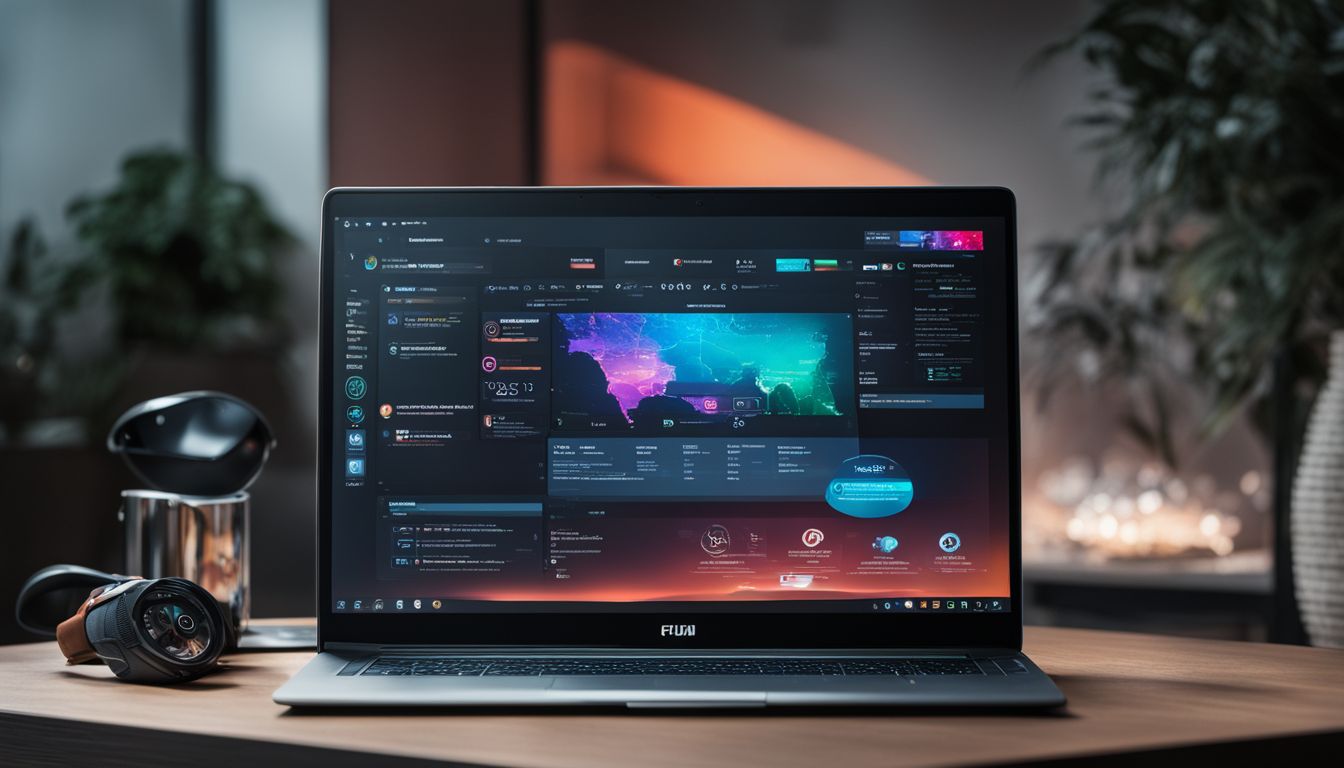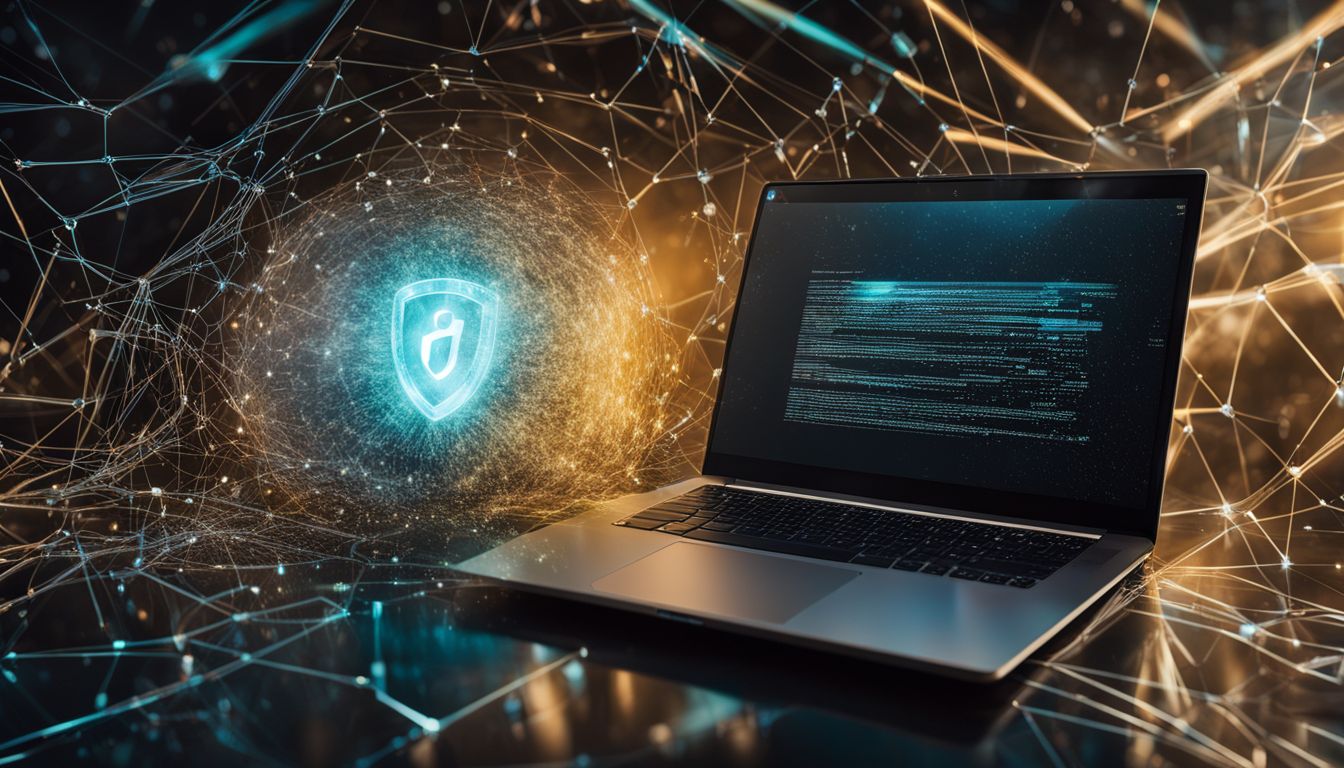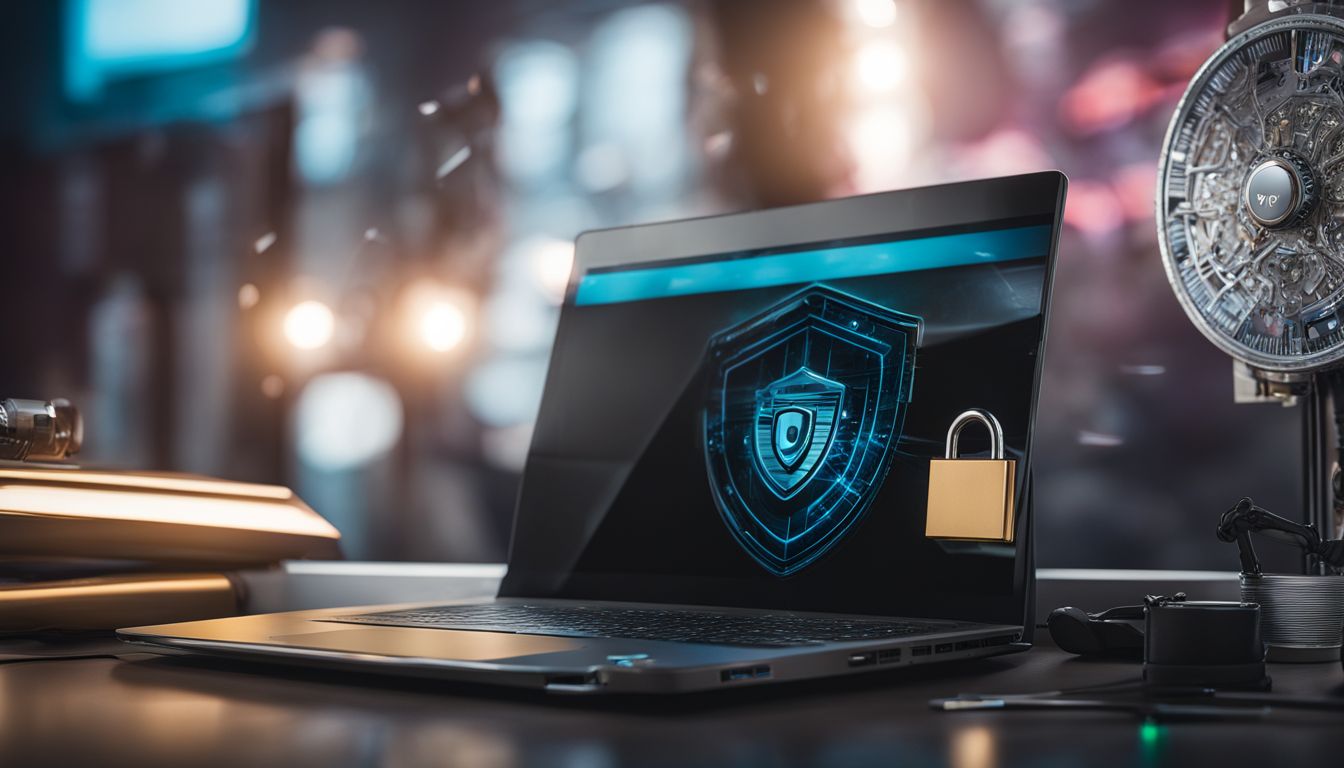- How to Choose Running Shoes for Different Terrains - January 2, 2024
- Improving Your Running Form: A Guide for Beginners - January 2, 2024
- The Science Behind Cushioning in Running Shoes - January 2, 2024
Last Updated on
In this age of advanced technology, safeguarding your laptop from harmful viruses is more important than ever. Did you know that a solid antivirus product serves as the best defence against computer viruses? Our in-depth guide to “Virus Protection for Laptops: Best Practices” will equip you with essential knowledge and practical tips on how to bolster your device’s security effectively.
Let us navigate through the world of cybersecurity together!
Key Takeaways
- Choose the right type of antivirus software for your laptop, such as standalone antivirus software or internet security suites.
- Enable real-time protection to continuously scan and detect viruses, worms, trojans, ransomware, and spyware in files on your laptop.
- Regularly scan external storage devices like USB flash drives to prevent potential virus infections when transferring files.
- Keep your antivirus software and its database updated to ensure optimal protection against new threats.
Types of Antivirus Software

There are several types of antivirus software available, including standalone antivirus software, internet security suites, cloud-based antivirus solutions, endpoint protection platforms, and mobile antivirus applications.
Standalone Antivirus Software
 Standalone antivirus software gives your laptop a shield against viruses. You install this kind of software on your computer or laptop. It works hard to find and stop bad code in files and programs.
Standalone antivirus software gives your laptop a shield against viruses. You install this kind of software on your computer or laptop. It works hard to find and stop bad code in files and programs.
Some standalone antivirus tools are free. Yet, you might need to sign up for a trial account first. This type of software is good for laptops used by one person.
Internet Security Suites
Internet Security Suites give many ways to protect laptops. They stop bad things, like viruses, from harming your device. This is part of the cybersecurity that they offer. These suites have more than just antivirus programs.
They come with tools for safe browsing and data privacy too. Some also have firewalls for extra safety online. The best thing about these suites is their all-round protection against threats on the internet.
Cloud-based Antivirus Solutions
Cloud-based antivirus solutions shield your laptop from harmful code. They work all the time to scan and get rid of malware. Your laptop stays safe from viruses, worms, trojans, ransomware and spyware.
One big plus is that these tools don’t slow down your laptop. They use power from the cloud to protect your laptop right away if new threats come up.
Endpoint Protection Platforms
Endpoint Protection Platforms are a type of antivirus software that is specially designed to secure multiple devices within a network, such as laptops and desktops. These platforms offer comprehensive protection against cybersecurity threats, helping in preventing and detecting cyber attacks on laptops and other devices.
By using endpoint protection platforms, you can reduce the risk of data breaches and protect sensitive information from being compromised. However, it’s important to note that these security services may consume high CPU resources, which could potentially lead to performance issues on your laptop or device.
Mobile Antivirus Applications
Mobile antivirus applications are a type of antivirus software specifically designed to provide virus protection for laptops. These applications play a crucial role in detecting and preventing malware from infecting devices.
They have features that can detect, quarantine, and block malware from running on laptops, ensuring the security of your device. Reputable security companies offer free versions of their mobile antivirus apps for basic protection, making them accessible to all users.
Overall, mobile antivirus applications are an essential component of cybersecurity for laptops, helping to keep your device safe and secure from threats.
Key Features of Antivirus Tools
Antivirus tools come with key features such as real-time protection, scanning external storage devices, regular database updates, enabling logging, and choosing the right type of antivirus software for your specific needs.
Real-time protection
Real-time protection is a key feature of antivirus software that continuously monitors your laptop for any potential threats. It involves scanning files as they are created or accessed, so if there is any malware or viruses present, the software can detect and remove them immediately.
This helps to prevent your laptop from being infected and keeps your data safe. Having real-time protection enabled on your antivirus software is an important best practice because it provides continuous protection against malware and ensures that you’re always protected while using the internet.
Scanning external storage devices
Antivirus software scans all attached devices and peripherals to prevent potential viruses from entering the system through external sources. It helps keep your laptop safe by scanning external storage devices for any harmful files or malware that could infect your computer. Here are some key points about scanning external storage devices:
- Automatic scans: Antivirus software can be configured to automatically scan removable drives, such as USB flash drives or external hard drives when they are connected to your laptop. This helps prevent the spread of viruses and other malware.
- Virus detection: When scanning external storage devices, antivirus software compares files on those devices with regularly updated databases of known viruses and malware. If a file matches a known threat, the antivirus program will take appropriate actions to protect your laptop.
- Data security: By scanning external storage devices, antivirus software helps ensure that any files you transfer to your laptop are free from viruses or other malicious code. This helps safeguard your data and protects against potential data loss or exposure.
- Drive scanning: Antivirus programs not only scan individual files on external storage devices but also scan the entire drive for any hidden threats. This comprehensive approach helps detect any malware that may be hiding deep within the device.
- Removable media security: Scanning external storage devices is especially important because portable devices can increase the risk of virus transmission. When you connect a USB drive or another removable media to your laptop, it’s essential to have antivirus software in place to scan for potential threats.
Database updates
Regular database updates are essential for maintaining optimal protection against online threats. These updates ensure that your antivirus software has the most up-to-date information on new viruses and malware.
By regularly updating your antivirus software’s database, you can help keep your laptop and other devices secure by staying ahead of cyber threats. Keeping your antivirus software up to date is one of the best practices for protecting your devices from viruses and malware, as it ensures that you have the latest tools and information to prevent any potential data breaches or security vulnerabilities.
Logging
Logging is an essential feature of antivirus tools. It allows users to monitor and track the activities of the antivirus software. By enabling logging, users can review and analyze valuable information about detected threats and actions taken by the software.
Regularly checking the logs for any suspicious activity is a best practice when using antivirus tools. Logging can also help identify patterns or trends in malware attacks, which enables users to take preventive measures and avoid future infections.
So, don’t forget to enable logging in your antivirus software for better protection!
Choosing the right type of antivirus software
To ensure effective virus protection for your laptop, it is important to choose the right type of antivirus software. There are various options available, such as standalone antivirus software, internet security suites, cloud-based antivirus solutions, endpoint protection platforms, and mobile antivirus applications.
Each type offers different features and capabilities to detect and remove cyber threats like malware, spyware, ransomware, and phishing attacks. When making a decision, consider recommendations from experts and user reviews.
For instance, Bitdefender is recognized as one of the best antivirus software in 2023 due to its exceptional malware protection and security. Selecting the right type of antivirus software will help safeguard your laptop against potential threats effectively.
Best Practices for Antivirus Software

Enable real-time protection, regularly scan external storage devices, keep antivirus software and database updated, enable logging, and use the right type of antivirus software for your needs.
Enable real-time protection
Real-time protection is an important feature of antivirus software because it scans files as they are created or accessed. This helps to prevent and detect malware, including viruses, worms, trojans, ransomware, and spyware. By enabling real-time protection on your laptop, you can ensure continuous scanning and proactive protection against security threats.
- Continuous scanning
- Proactive protection
- On-access scanning
- Threat detection
- Malware prevention
- Behavior analysis
- Suspicious file monitoring
- Real-time monitoring
- Malicious software removal
- Virus detection
Regularly scan external storage devices
Regularly scanning external storage devices is an essential step in virus protection for laptops. It helps to ensure the safety of your files and data. Here are some reasons why regular scanning is essential:
- Viruses can enter your laptop through external sources, such as attached devices or peripherals.
- Removable media devices like jump drives and CDs can carry viruses if not adequately secured or cleared of sensitive data.
- Scanning external storage devices helps to detect and remove any potential viruses before they infect your laptop.
- Regular scans ensure that your antivirus software is up-to-date and able to protect against the latest threats.
- It’s a proactive measure that can help prevent data loss and system damage.
Keep antivirus software and database updated
Keeping your antivirus software and its database updated is crucial for ensuring optimal protection against online threats. Here are some essential points to remember:
- Check for updates regularly: Manually check for available updates by opening your antivirus software and looking for update options.
- Enable automatic updates: If your antivirus software offers an automatic update feature, enable it to ensure that you receive the latest virus definitions and security patches without having to manually search for them.
- Stay vigilant about updates: Remember that new viruses and malware are constantly being developed, so it’s important to stay up-to-date with the latest updates from your antivirus software provider.
- Update your database as well: In addition to updating the software itself, make sure to update the virus database regularly. This will ensure that your antivirus program has the most recent information on emerging threats.
- Enhance effectiveness: Regularly updating both the software and its database will enhance the effectiveness of your antivirus program in detecting and blocking viruses and malware.
Enable logging
Enabling logging is an essential step in protecting your laptop from viruses. Here are some reasons why you should enable logging:
- Track antivirus scans: Logging allows you to monitor when and how often your antivirus software scans your laptop for viruses.
- Identify suspicious activities: By reviewing the logs, you can spot any unusual or suspicious activities that may indicate a virus infection.
- Take appropriate actions: If the logs show signs of a potential virus, you can take immediate action to remove it or quarantine it to prevent further damage.
- Analyze security incidents: Logging provides a valuable resource for analyzing any security incidents or breaches that may have occurred on your laptop.
- Investigate security breaches: In the event of a breach, the logs can help you investigate how the breach happened and what steps need to be taken to prevent future incidents.
- Ensure compliance with security measures: Keeping detailed logs can help demonstrate that you have taken necessary security measures, which may be required for compliance with certain regulations or policies.
Use the right type of antivirus software for your needs
Choosing the right antivirus software is important for keeping your laptop safe from viruses. There are different types to choose from, such as standalone antivirus software, internet security suites, cloud-based solutions, and mobile applications.
Each type has its own features and benefits. It’s essential to consider factors like real-time protection, scanning external storage devices, regular updates, and logging capabilities when selecting the antivirus software that suits your needs best.
Taking the time to choose the right type of antivirus software can help ensure that your laptop is protected against cyber threats and keeps your data safe.
Additional Laptop Security Best Practices
Use a strong password, disable booting from CD and USB, use a VPN, encrypt your hard drive, add a privacy screen, and use secure email.
Use a strong password
A strong password is essential for laptop security. Here are some best practices to create a secure password:
- Use a combination of letters, numbers, and symbols.
- Avoid using common words or easily guessable information, like your name or birthdate.
- Make it at least eight characters long.
- Include both uppercase and lowercase letters.
- Consider using a passphrase instead of just a single word.
- Regularly change your password to maintain its security.
Disable booting from CD and USB
To enhance your laptop’s security, consider disabling the option to boot from CD and USB. This will protect your device against malware and viruses that can enter through external devices during the booting process. By doing this, you ensure that only trusted and secure operating systems are loaded onto your laptop. You also gain better control over the software and programs installed on your device. Additionally, disabling booting from CD and USB adds an extra layer of protection against unauthorized access to sensitive data, reducing the risk of data breaches. It also helps mitigate the spread of malware within a network.
Use a VPN
Using a VPN, or Virtual Private Network, is an important practice in laptop security. A VPN creates a secure and encrypted network connection, which helps protect against unauthorized access and keeps your online communication private.
This is especially crucial when using public networks like Wi-Fi hotspots, as they can be vulnerable to hacking and data theft. By using a VPN, you can ensure that your sensitive information remains safe from prying eyes.
Additionally, a VPN provides malware protection by encrypting your internet traffic and preventing malicious software from infiltrating your device. It also allows for a flexible network connection to various services while maintaining the highest level of security.
Encrypt your hard drive
Encrypting your hard drive is a crucial step in protecting your laptop and its data. Here are some best practices for encrypting your hard drive:
- Encrypting your hard drive helps prevent unauthorized access to your data.
- It safeguards your private and personal information if your laptop gets lost or stolen.
- Encrypting your hard drive is considered a key practice for laptop security.
- You can easily encrypt your hard drive by following a guide or tutorial.
- Combining encryption with other security measures like using strong passwords and regularly backing up data enhances overall protection.
Add a privacy screen
A privacy screen is an essential accessory for laptops. It helps protect your privacy in public. Here are some reasons why you should consider adding a privacy screen to your laptop:
- It prevents visual hackers from seeing your sensitive information.
- Keeps confidential information confidential.
- Protects against visual hacking in crowded places like cafes or airports.
- Adds an extra layer of security to your laptop.
Use secure email
To protect your laptop from cyberattacks, it’s essential to use secure email practices. Email viruses are a common way for malicious code to infect devices and compromise computer security.
By using secure email, you can prevent unauthorized access and protect sensitive information. One way to do this is by encrypting your email accounts, which helps safeguard them from email-based cyberattacks.
Additionally, installing anti-malware software on both your email servers and clients is a good practice for enhancing email security. By taking these precautions, you can ensure that your emails are safe and free from any potential threats.
Conclusion
In conclusion, virus protection is crucial for keeping our laptops safe from malicious threats. By using effective antivirus software and following best practices like enabling real-time protection, regularly scanning external storage devices, and keeping software up to date, we can significantly reduce the risk of virus infections.
Additionally, adopting additional laptop security measures such as using strong passwords, disabling booting from CD and USB, and encrypting data adds extra layers of protection. By practicing these best practices consistently, we can ensure that our laptops are secure against online threats and maintain a high level of cybersecurity.
FAQs
1. Why is virus protection important for laptops?
Virus protection is essential for laptops to prevent malware infections, protect personal information, and ensure the smooth running of your device.
2. What are some best practices for virus protection on laptops?
Some best practices for virus protection on laptops include regularly updating antivirus software, avoiding suspicious email attachments or downloads, and practising safe browsing habits.
3. How often should I update my antivirus software?
It’s recommended to update your antivirus software at least once a week or whenever new updates become available to ensure you have the latest protections against emerging threats.
4. Can I use multiple antivirus programs on my laptop for extra protection?
No, it’s not recommended to use multiple antivirus programs simultaneously, as they can conflict with each other and decrease overall system performance. Stick to one reputable program and keep it updated.
5. What should I do if my laptop gets infected with a virus despite having antivirus protection?
If your laptop gets infected with a virus despite having antivirus protection, immediately disconnect from the internet, run a full system scan using your antivirus software, and follow any instructions provided by the software to remove the infection. If needed, seek professional help from an IT specialist.

